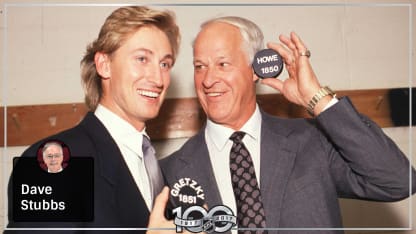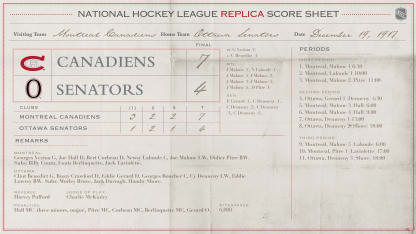A century of the NHL has been about the men who have played the game. It's been about the battles they have waged, the Stanley Cup titles they have won, sometimes against all odds, and the championships they have not won when everything suggested that the sterling trophy was all but engraved.
Thumb back through the pages charting the players and the momentous Stanley Cup Playoff games and the often incredible events that changed the complexion of a series, a game, a period or even a shift, and you will find so many numbers.
All-time playoff stats for Gretzky, Howe, all players now on NHL.com
Fans can explore every postseason box score, player game logs from 1917-18 to present

RELATED: [Explore All-Time Playoff Results | All-Time Stanley Cup Winners]
Statistics are the foundation of the NHL, the digital bedrock on which both the great players and the journeymen built the game. Before Corsi and Fenwick and the percentages of advanced stats, analyses that are all the rage today, were simply the goals, scored at even strength, on power plays and shorthanded; the assists that set up the goals; the penalty minutes that always had the potential to change the tide; and the goaltender's rudimentary goals-against average.
Now comes an online resource for the most hard-core fan, to whom hockey's basic numbers are almost a religion. As part of its ongoing Centennial celebration, the NHL, on its NHL.com website, is offering a statistical treasure chest in the form of box scores from every postseason game in NHL history and richly detailed playoff game logs for every individual who has skated or tended goal in the postseason.
In concert with SAP, the NHL's application software and database partner, the League is now adding to the wealth of statistics that have been on NHL.com for roughly a decade.
NHL.com/stats
provides SAP-powered filters to offer fans the ability to cross-reference historic statistics by game-level context such as home, away, game decision and opponent.
Over the past five-plus years, the NHL has been digitally archiving scoresheets from the League's 1917 birth through the present to preserve a priceless history, many scoresheets from the early era having been produced almost illegibly by hand. With this archiving and new filters, more detailed statistics have become available, and these new playoff categories have now been added to NHL.com.

There is no shortage of places on the Internet to find overall and season-by-season summaries of players' careers. But nowhere else will you find playoff game logs extracted from the scoresheets of every NHL postseason game since the 1917-18 season.
"We still have other things that we want to add," said Benny Ercolani, the NHL's statistician and information officer, who began crunching numbers for the League in 1976 in Montreal under statistician Ron Andrews.
Ercolani has led a team of people to extrapolate this data from scoresheets, vintage and modern, and bring it online, double- and triple-checking the stats and correcting errors along the way.
Plans are in the works to enrich the website greater still with regular-season game logs and box scores, along with more video and photography.
"I can't tell you how many times fans have called me and said, 'There was a game I watched when I was a kid, I think
Jean Beliveau
scored, my dad brought me and I still have the ticket,' " Ercolani said. "Now fans can go look at the game (playoff games for now) as we fill in the holes, and that's always been a big thing for me."
With this new reference, hockey purists, historians and even the mildly curious will find the proverbial pot of gold at the end of the statistical rainbow.
I chose to dip first into the playoff game logs now offered under the name of
Wayne Gretzky
, the most prolific player in NHL history for goals and assists, assembled here in one place for the first time. Gretzky led the League in playoff assists and points five times in six seasons with the Edmonton Oilers between 1982-83 and 1987-88, winning four Stanley Cup championships, so he seemed like the perfect springboard into the new stats pool.
Gretzky played in all 18 games of the Oilers' 1984-85 Stanley Cup run, scoring a League-high 47 points (17 goals, 30 assists). Edmonton won its first nine playoff games, sweeping the Los Angeles Kings in three and the Winnipeg Jets in four before beating the Chicago Black Hawks (then two words) twice to open the Campbell Conference Final, which the Oilers won in six. The Oilers lost to the Philadelphia Flyers to open the Stanley Cup Final, followed by four straight victories to win the title.
A look at Gretzky's
game-by-game performance
shows that he went scoreless only twice during the Oilers' 18-game run, in
Game 3 against the Black Hawks
and in
Game 1 against the Flyers
.
The Great One racked up one-third of his 30 assists during one four-game span. In
Game 4 against Winnipeg
, an 8-3 victory, he scored three goals on seven shots and had four assists; in that game, and in a 10-5 victory in
Game 5 against Chicago
, he was plus-5.
Next, I turned back the pages to the career of the late
Gordie Howe
, an idol of Gretzky.
Six times during his 21 trips to the NHL playoffs, Mr. Hockey led the League or was tied for the lead in postseason points, twice during seasons that brought his Detroit Red Wings the Stanley Cup. The first of those two seasons was
1951-52
, when he had seven points (two goals, five assists) in eight games, and the other was
1954-55
, Howe scoring 20 points (nine goals, 11 assists) in 11 games.
Howe had two goals and an assist in a 3-0 victory in
Game 3 of the 1951-52 Stanley Cup Final
against the Montreal Canadiens, his best single-game output that postseason. It's remarkable, perhaps, that a man who played with razor-sharp elbows was assessed only two penalty minutes that entire playoff season, coming in his three-point game.
But Mr. Hockey wasn't exactly Mr. Clean in the 1954 Final against the Canadiens, taking 23 penalty minutes in Games 2-5, including a dozen while finding time to score once and get one assist in a 5-2 victory in
Game 3 in Montreal
.
There's
Larry Robinson
, the legendary defenseman who never missed the postseason during 17 seasons with the Canadiens from 1972-73 to 1988-89 and three more, from 1989-90 to 1991-92, to end his career with the Los Angeles Kings. Robinson might have been a goofy plus-700 in the regular season with Montreal, but in the Canadiens' three-game elimination at the hands of the Oilers in the 1981 Preliminary Round, the future Hall of Famer was a
very uncharacteristic minus-9
.
Naturally, goaltending has played a huge role in the playoffs through the decades. So it was fun to rewind to the 1950s and '60s to have a closer look at the prime of pioneer
Glenn Hall
, who anchored the Black Hawks when they won the Stanley Cup in 1961.
What's truly enlightening with this statistical project is that a goalie's save percentage, a stat officially kept beginning in the early 1980s, is presented wherever shot totals were provided on scoresheets.
So there was Game 3 against the Canadiens in the 1961 Semifinals, a 2-1 home victory for Chicago. Hall made 53 saves for
a stunning .981 save percentage in that game
, which was decided on Murray Balfour's power-play goal 12:12 into the third overtime against Montreal goalie
Jacques Plante
.
For a century, thousands of NHL players have battled for the Stanley Cup. For every man who has played in the postseason, you can now find game logs that break down every one of his playoff games.
Each time you poke your shovel into this fertile digital soil, you will unearth a little more treasure. So excuse me now while I go dig into Dave "Tiger" Williams of the Toronto Maple Leafs, who was assessed 34 penalty minutes on April 22, 1976 in
an 8-5 home win
against the Philadelphia Flyers.

















